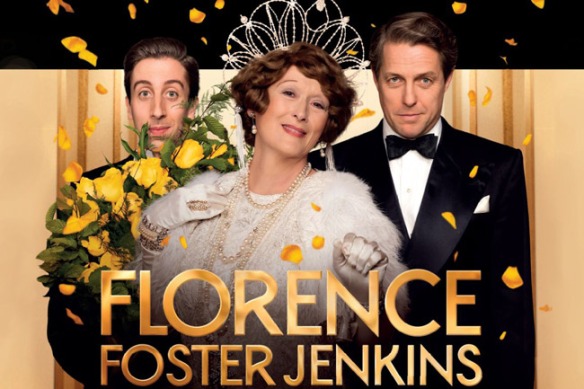What’s with that Florence?
Florence Foster Jenkins is a legendary persona in the circle of classical music lovers, whom many called the worst opera singer in the world. Her colorful life gave plot to several plays (the most famous one is “Glorious!”), and recently, also a movie. And with Meryl Streep in the lead role!
“Florence Foster Jenkins” feels like a movie adaptation of a play. A large part of the action takes place strictly in Florence’s apartment, which looks like a completely different era than the one in which the film actually takes place. Judging by Florence’s style and the decor of her apartment, she stopped somewhere at the beginning of the twentieth century. Meanwhile, the film takes place during World War II and the world moved on… but can Florence deal with it?
The story of Florence Foster Jenkins is the story of triumph of passion over talent. Being a big fan of classical music, and quite a rich person, Florence was active in the world of New York music lovers. Very often she went onstage as well, to the delight of her friends. Florence could not sing. But she sang with passion, tackling even the most difficult arias. Originally she performed at private concerts, but the news of her unique voice only spread. In 1944, Florence, aged 76, sang a sold-out concert at the legendary Carnegie Hall.
The relationship between passion and talent is a subject in numerous films about artists (Milos Forman’s Amadeus comes to my mind). The case of Florence is interesting because we know that in her youth she was a talented pianist, so she couldn’t not have musical hearing. The quality of her vocal performance was probably due her long-term illness (syphilis, which causes degeneration of the central nervous system) and the drugs used at the time to cure it, arsenic and mercury (which, in turn, could result in partial loss of hearing).
Secondly, “Florence Foster Jenkins” is a love story. The relationship between Florence and her longtime companion, a British actor and illegitimate son of an aristocrat, St. Claire Bayfield is the type that is rarely shown on screen. Their relationship was really quite unique.
Florence was a few years older than Bayfield, but it was definitely him who took care of her and all the prosaic things related to their comfortable lives. Bayfield even made sure that Florence’s concerts were only attended by people who could behave, that no sharp objects were ever in her presence and that at parties there was no shortage of her favourite potato salad. The love and tenderness between the two is clear and true. However, they did not have sexual relations (at least in part due to Florence’s illness). In fact, Bayfield had a separate apartment (paid for by Florence), where he lived with his longtime girlfriend Kathleen Weatherley, whom he married after Florence’s death. There is a scene in the film where Bayfield admits to Florence’s accompanist, McMoon, that Florence knows that she is not the only woman in his life, but does not know the details. I think it’s a really interesting relationship and it’s a bit of a shame that it was not explored more.
What about the film itself?
Ultimately, “Florence Foster Jenkins” is a very good and very concise movie. Nevertheless, it is tempting to think what movie it could be if its creators explored how it came to be that Florence closed herself (or maybe was closed by her caring, well-wishing friends) in this magical, but artificial world. If this bubble was punctured in some way a little earlier than in the penultimate scene.
The great cast is of course great. This is obvious when the main role is played by Meryl Streep (I’ve saying it for years, she could play a chair and get an Oscar nomination for it). The film also stars Hugh Grant and the delightful Simon Helberg, whose facial expressions during the scenes of Florence’s vocal performances KILL ME. Incidentally, the singing and accompaniment were reportedly recorded live on the set. All the more credit to Meryl Streep and Simon Helber, because both of them are truly phenomenal!
The costumes are also great. I particularly liked the stage creations worn by Florence, who loved elaborate costumes with big ornaments and headpieces. A woman after my own heart!
The verdict
Reminiscing about this film and Florence herself, I think that she was a remarkable woman. She loved music with all her heart and really did a lot to support this art. Many of her fans recognized her sincere passion and supported Florence in her performances. And the fact that her performances weren’t objectively the best – does it ultimately matter?



And that’s how Florence sounded in real life:

